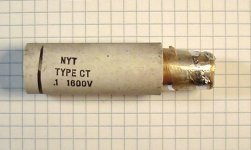I know I saw something on safety tips while building an amp. I searched and didn't find anything. Could someone point me to the link or site that I saw? I'm about to start building some amps and a preamp and all I've ever built is speakers. At least I do know resistors from caps.
Katherine Hepburn said to Spencer Tracey "Never Assume" -- (I think the movie was "Desk Set", but I wasn't born then...)
now my kid's high school chemistry teacher said "Assume" makes an *** outta U and ME, so here are some tips:
never assume that a capacitor is discharged
never assume that the unit you are working with is unplugged
now my kid's high school chemistry teacher said "Assume" makes an *** outta U and ME, so here are some tips:
never assume that a capacitor is discharged
never assume that the unit you are working with is unplugged
Jhovis said:Discharging caps was my main concern. I have to figure out how to do that.
A resistor, of sufficiently high resistance and power rating, attached across the capacitor with a well insulated tool in one hand and the other in your back pocket.
Too low a resistance (like a pair of pliers 😱 ) and sparks, explosions, and arc-welding may occur.

You are very prudent in asking such questions.

Good luck, and Welcome,
George Ferguson
A resistor, of sufficiently high resistance and power rating, attached across the capacitor with a well insulated tool in one hand and the other in your back pocket.
And also make sure your arm isn't resting on the chassis!

Never use no matter how tempting; A SCREWDRIVER!
I use a dedicated 18k 1000V 3W resistor test lead combination just for that purpose. Works very well for me. For voltages over 400V I use a 39k 1000V 7W resistor, salvaged from a tube TV. Of course you have to take into account voltage/capacity = current!
Wayne 🙂
- Status
- Not open for further replies.
- Home
- Amplifiers
- Tubes / Valves
- Tube Safety
